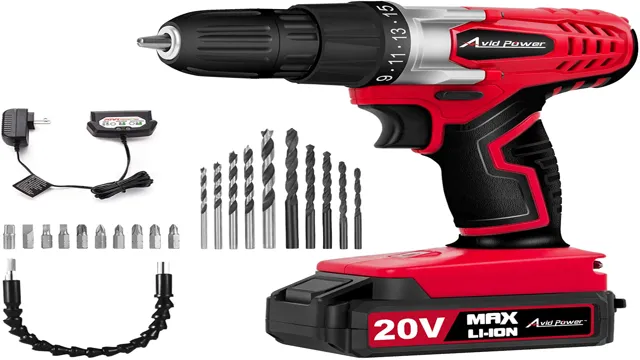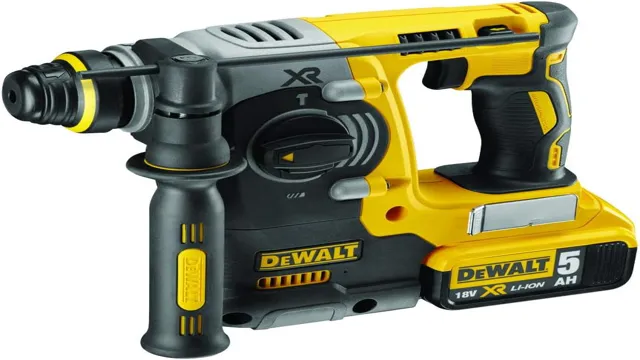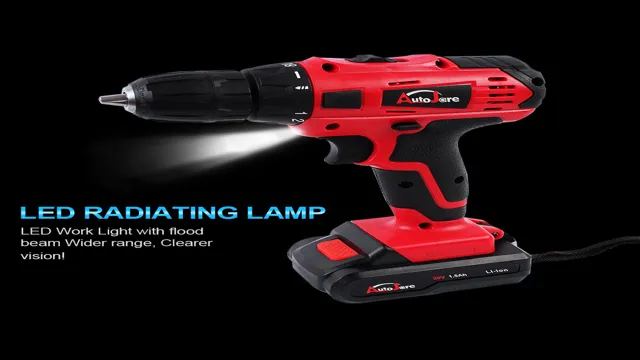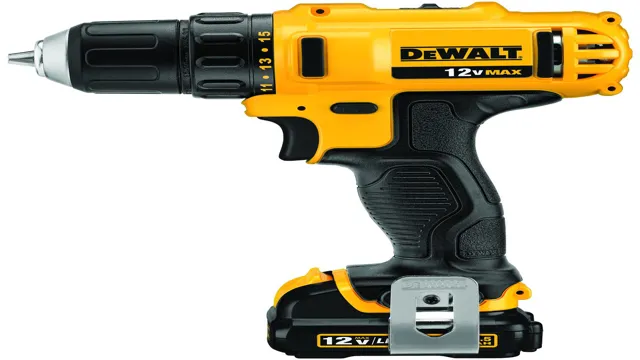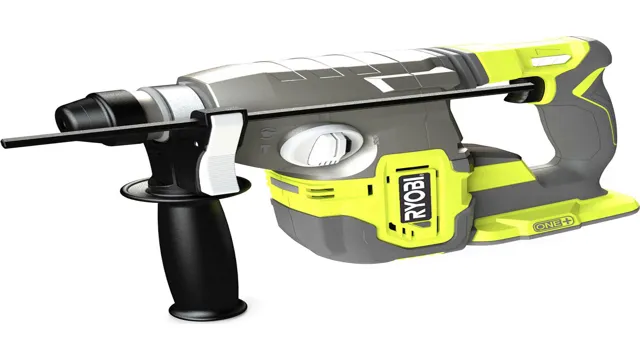Why Some Cordless Drills are 20V or 18V: The Science Behind Battery Voltages

Cordless drills have become an essential tool in every homeowner’s toolbox, with many opting for more powerful versions like the 20V or 18V models. But why are these specific voltages so common with cordless drills? Well, the answer lies within the impact it has on the tool’s performance. Think of it this way, the higher the voltage, the more power the drill has to offer, resulting in better performance and more efficient battery life.
It’s like having a sports car with a bigger engine that can go faster, tackle tougher terrains, and last longer on the road. So, why not go for an even higher voltage? The answer to that is simple too. Ultimately, there needs to be a balance between power output and portability.
While higher voltage offers more power, it also increases the weight of the drill, making it less portable and comfortable to use. So, manufacturers have found that 18V and 20V cordless drills provide the perfect balance of power, weight, and battery life. In conclusion, 18V and 20V cordless drills are the most common choices for a reason.
They offer enough power to handle most DIY projects while remaining portable and lightweight. When it comes to cordless drills, it’s not all about the volts but finding the perfect balance of power and weight to suit your needs.
Voltage Explained
Have you ever wondered why some cordless drills are labeled as 20v or 18v? This measurement refers to the voltage of the battery that powers the drill. Higher voltage means more power, which is why drills with higher voltage batteries are often more expensive and marketed as “professional grade.” However, it’s important to note that a drill’s voltage isn’t the only factor determining its power and performance.
The design of the motor and transmission also play a significant role. For example, a drill with an 18v battery and a high-performance motor may outperform one with a 20v battery and a lower-quality motor. So, when choosing a cordless drill, it’s important to consider both voltage and overall performance to find the best tool for your needs.
How Voltage Affects Drilling Power
Voltage Voltage plays a crucial role in determining the power and efficiency levels of a drilling machine. Simply put, the voltage of a drilling machine is the amount of electrical energy supplied to it. A higher voltage translates to more power and thus faster and more efficient drilling.
Conversely, a lower voltage means less power and slower drilling. It is therefore essential to ensure that a drilling machine has the right voltage rating for the material being drilled and the desired drilling output. Additionally, it is essential to monitor voltage levels during drilling to ensure that the machine is operating optimally, as fluctuations in voltage can affect its performance.
In summary, voltage is an essential factor to consider when selecting and using drilling machines, and it plays a crucial role in the drilling power and efficiency levels.
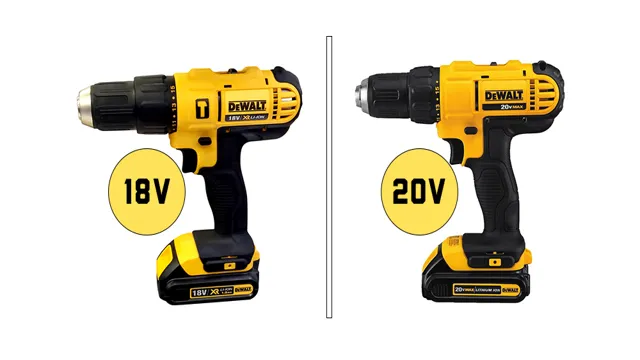
Battery Capacity and Voltage
Voltage Voltage is an essential aspect of battery technology. It refers to the amount of electrical potential energy that a battery can produce. The higher the voltage of a battery, the more electrical energy it can provide to your device.
Voltage is measured in volts and is indicated by the symbol ‘V’. A typical household battery has an average voltage of 5V to
6V, while a car battery has a voltage of 12V. It’s important to understand the voltage requirements of your device to select the right battery for it. Too much or too little voltage can damage your device, and it won’t function correctly.
In simple terms, voltage is like the pressure in a water pipe. Just as high pressure pushes water through the pipes, high voltage pushes electrical energy through the wires. So, if you need more energy, you must choose a battery with a higher voltage.
Advantages of 20V Cordless Drills
When it comes to cordless drills, you may have noticed that some models are labeled as 20V or 18V. This designation refers to the voltage of the drill’s battery, and 20V packs are becoming increasingly popular. So, why choose a 20V cordless drill over one with a lower voltage? One significant advantage is power.
20V drills can provide more torque and speed than lower voltage models, making them ideal for heavy-duty tasks like drilling into tough materials or driving large screws. Additionally, 20V drills generally have longer battery life compared to lower voltage options, meaning you can work for longer periods of time without needing to recharge. This makes them fantastic for professionals who need to tackle big jobs or DIY enthusiasts who want a reliable tool that won’t quit halfway through a project.
You May Also Love:
Overall, if you want a powerful and long-lasting cordless drill that can handle any task, a 20V model might be just what you need.
Increased Power and Torque
One major advantage of 20V cordless drills is their increased power and torque. With a higher voltage, these drills are able to deliver more force and therefore complete tougher jobs with ease. This makes them an ideal choice for heavy-duty tasks such as drilling through thick metal or dense hardwood.
Additionally, higher power and torque means that these drills can work faster and more efficiently, saving you time and effort in the long run. Whether you’re a DIY enthusiast or a professional contractor, a 20V cordless drill is sure to give you the added performance boost you need to tackle any job with confidence. So if you’re looking for a tool that offers both power and versatility, a 20V cordless drill is definitely worth considering.
Better Battery Performance
20V Cordless Drills One of the main advantages of 20V cordless drills is their better battery performance. Unlike their 18V counterparts, 20V drills offer a higher level of power and torque, allowing them to handle tougher jobs with ease. But this higher level of performance would be useless if the battery life was short-lived.
Fortunately, 20V cordless drill batteries are designed to last longer, which means you can complete more tasks before needing to recharge. Additionally, many 20V cordless drills feature lithium-ion batteries, which have a longer lifespan than traditional nickel-cadmium batteries. This not only saves you money in the long run but also reduces waste, making them more environmentally friendly.
With better battery performance, 20V cordless drills give users the ability to focus on the task at hand without worrying about the tool running out of juice.
Versatility and Compatibility
Versatility and Compatibility of 20V Cordless Drills When it comes to power tools, versatility and compatibility are two critical factors to consider. And that’s where 20V cordless drills come in! These devices are designed for a range of applications, from drilling holes in wood to installing screws in metal or plastic. They’re lightweight, portable, and easy to maneuver, so you can use them almost anywhere.
What’s more, 20V cordless drills are compatible with a wide range of drilling bits, which means you can switch from one task to another without having to change your tool. This is particularly helpful if you’re working on a big project that requires a lot of different types of holes. So, if you’re looking for a versatile, dependable, and efficient power tool, a 20V cordless drill is definitely worth checking out!
Advantages of 18V Cordless Drills
If you’re wondering why some cordless drills are 20v or 18v, there are several advantages to choosing an 18V cordless drill. Firstly, they offer a great balance of power and portability. 18V drills are strong enough to handle heavy-duty tasks like drilling through thick wood or metal, but they’re also lightweight enough to carry around for extended periods without putting too much strain on your arms.
Additionally, an 18V battery is typically more affordable than a 20V battery, giving you a cost-effective option without sacrificing power. Furthermore, many manufacturers offer a wide range of accessories that are compatible with 18V batteries, making it easier and more convenient to tackle a variety of tasks. So, while there are a few different options when it comes to cordless drills, 18V drills are a solid choice that’s worth considering if you’re looking for a powerful, versatile, and cost-effective tool.
Lighter and More Portable
18V cordless drills have taken the market by storm, and for good reason. They offer many advantages over their corded counterparts. Firstly, they are much lighter and more portable, making them perfect for anyone who needs to move around frequently.
Whether it’s working on a construction site or doing DIY projects at home, the 18V cordless drill allows for easy maneuverability and flexibility. Additionally, its battery-powered design eliminates the need for an electrical outlet, making it ideal for those working in remote locations. The 18V cordless drill is a versatile tool, capable of handling a wide variety of tasks, from drilling holes in wood and metal to driving screws and bolts.
Its power and performance make it an essential tool for any handyman or DIY enthusiast. So if you’re looking for a tool that is both powerful and portable, the 18V cordless drill is the way to go!
Suitable for Light Duty Applications
Cordless drills are essential tools for households and professionals. Among the different types of cordless drills, the 18V cordless drills are the most popular. Even though they are suitable only for light-duty applications, their advantages make them a go-to choice.
One of the main advantages is their portability. Since they are cordless, there is no need to worry about the power source or the length of the cord. This makes them ideal for jobs in areas without electrical outlets.
Additionally, they offer more power than smaller cordless drills, making them perfect for drilling larger holes and for tackling tougher materials such as hardwoods and metals. The versatility of the 18V cordless drills makes them efficient tools for repair and maintenance work. With the right attachments, these drills can also serve as screwdrivers, sanders, and polishers, reducing the need for multiple tools.
Overall, the 18V cordless drill is a handy and efficient tool that provides practicality and flexibility when it comes to the majority of house projects and tasks.
Conclusion
In conclusion, the reason why some cordless drills are labeled as 20v or 18v is all about power and performance. Manufacturers have designed their drills to provide the maximum amount of torque and speed to get the job done quickly and efficiently, and these higher voltage ratings allow for the added power necessary to accomplish this. So, the next time you need to drill a hole or drive a screw, make sure you have a drill that packs a punch with its 20v or 18v rating!”
FAQs
What is the difference between a 20v and 18v cordless drill?
The main difference is the voltage of the battery, with a 20v battery typically providing more power and longer run time than an 18v battery.
Can an 18v cordless drill handle the same tasks as a 20v cordless drill?
It depends on the specific models, but in general, a 20v drill may be better suited for heavier duty tasks that require more power.
Are 20v cordless drills more expensive than 18v ones?
This can vary depending on the brand and model, but in general, 20v cordless drills may be slightly more expensive than comparable 18v models.
What types of batteries are typically used in 20v and 18v cordless drills?
Both types of drills can use a variety of battery types, including lithium-ion and NiCad batteries.
How long do the batteries typically last in 18v and 20v cordless drills?
Again, this can vary depending on the specific model and usage, but in general, 20v batteries may have a longer run time than 18v batteries.
Can you use a 20v battery on an 18v cordless drill?
No, typically the voltage of the battery and the drill must match.
Are there any downsides to using a 20v cordless drill over an 18v one?
One potential downside is that 20v cordless drills may be heavier and more cumbersome to use compared to 18v models.

